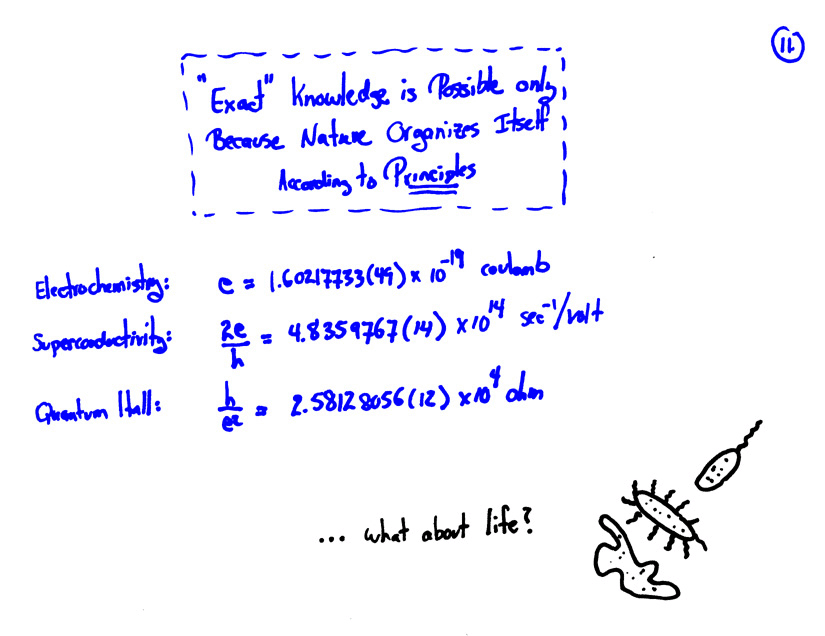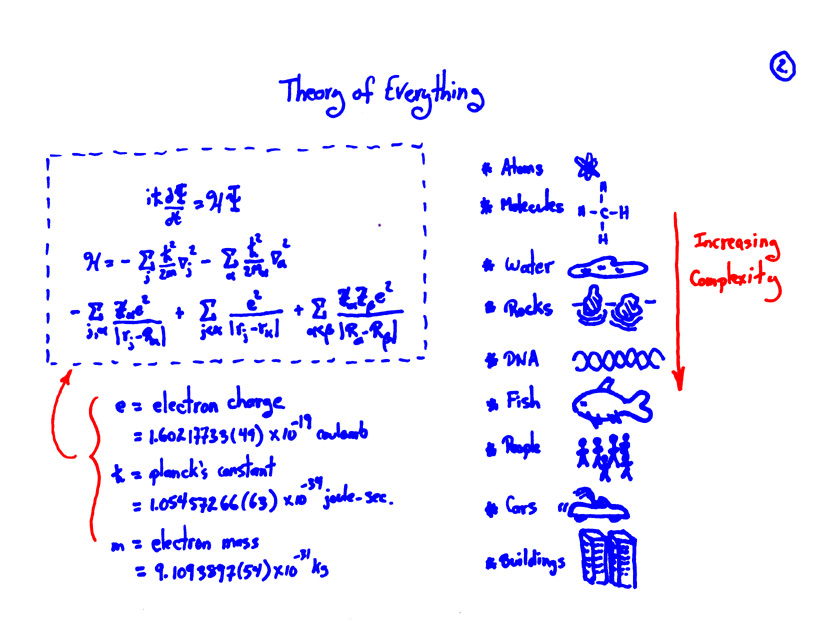![]() wiki(moderated)
wiki(moderated)
Theories of Everything
An article by R.B. Laughlin (co-Nobel prize winner in 1998 for physics) and David Pines in PNAS discusses theories of everything.
The Theory of Everything is a term for the ultimate theory of the universe—a set of equations capable of describing all phenomena that have been observed, or that will ever be observed (1). It is the modern incarnation of the reductionist ideal of the ancient Greeks, an approach to the natural world that has been fabulously successful in bettering the lot of mankind and continues in many people’s minds to be the central paradigm of physics. A special case of this idea, and also a beautiful instance of it, is the equation of conventional nonrelativistic quantum mechanics, which describes the everyday world of human beings—air, water, rocks, fire, people, and so forth.
However, these equations cannot be accurately solved for a number of particles that exceed about 10.
Predicting protein functionality or the behavior of the human brain from these equations is patently absurd. So the triumph of the reductionism of the Greeks is a pyrrhic victory: We have succeeded in reducing all of ordinary physical behavior to a simple, correct Theory of Everything only to discover that it has revealed exactly nothing about many things of great importance.
Laughlin writes on his website (lecture):
We like to think that the fundamental basis of all things is a set of equations describing the way the most basic particles of nature move - quantum mechanically, of course. We like to joke about these equations as the "Theory of Everything" because they would be able to describe all things in the universe if we could solve them. But one can see from this list of "things" that the whole idea is absurd. The equations on the left are, to the best of our knowledge, the "theory of everything" for people-scale phenomena, but they are much too hard to solve even for a large molecule like DNA, much less a fish or a person. The real reason we understand these more complicated things is because we observe them and know from our observations that they obey rules. These rules are not deduced from the "theory of everything", although we believe they would if the equations were ever solved properly. Unfortunately, the latter cannot be tested because the problem is bigger than any computer that now exists, or even any computer that can ever be built.
Thus I have come to the point I wanted to make in this lecture. Human beings understand and control the world they live in not because they have mastered the ultimate causes of things but because nature kindly organizes itself according to principles, and in this way allows us to understand. Indeed, every physical quantity known to great accuracy owes this accuracy to a collective principle we have identified and named. Our search for the ultimate causes is actually a myth, as are the allegations that this search has been successfully concluded, so that science is at an end.

In an article in Science (2004) Laughlin writes:
In discussing cosmic matters it is impossible not to draw analogies with science fiction art from time to time, for the issues are as large as those depicted in such films and equally mysterious, despite being experimentally constrained. Our knowledge of the cosmos is still very primitive, and much of our thinking about it correspondingly speculative, more along the lines of what might plausibly have been than what is so. Plausibility is an interesting concept in theoretical physics, usually amounting to either a physical analogy with something observed to occur elsewhere in nature or a mathematical extrapolation of microscopic law. The latter, however, is actually a shibboleth, for the things that matter are nearly always collective organizational phenomena that cannot be reliably predicted from microscopics. The shapes of galaxies and the behavior of cosmic jets are simple cases in point, but the observation also applies to the grandest issues of modern cosmology, inflationary expansion and the hierarchical consolidation of matter after the big bang [2-4]. The absence of predictive power is actually self-evident, since there would be no point in measuring these things if one could calculate them. As a practical matter, all plausibility arguments that count are analogies.
